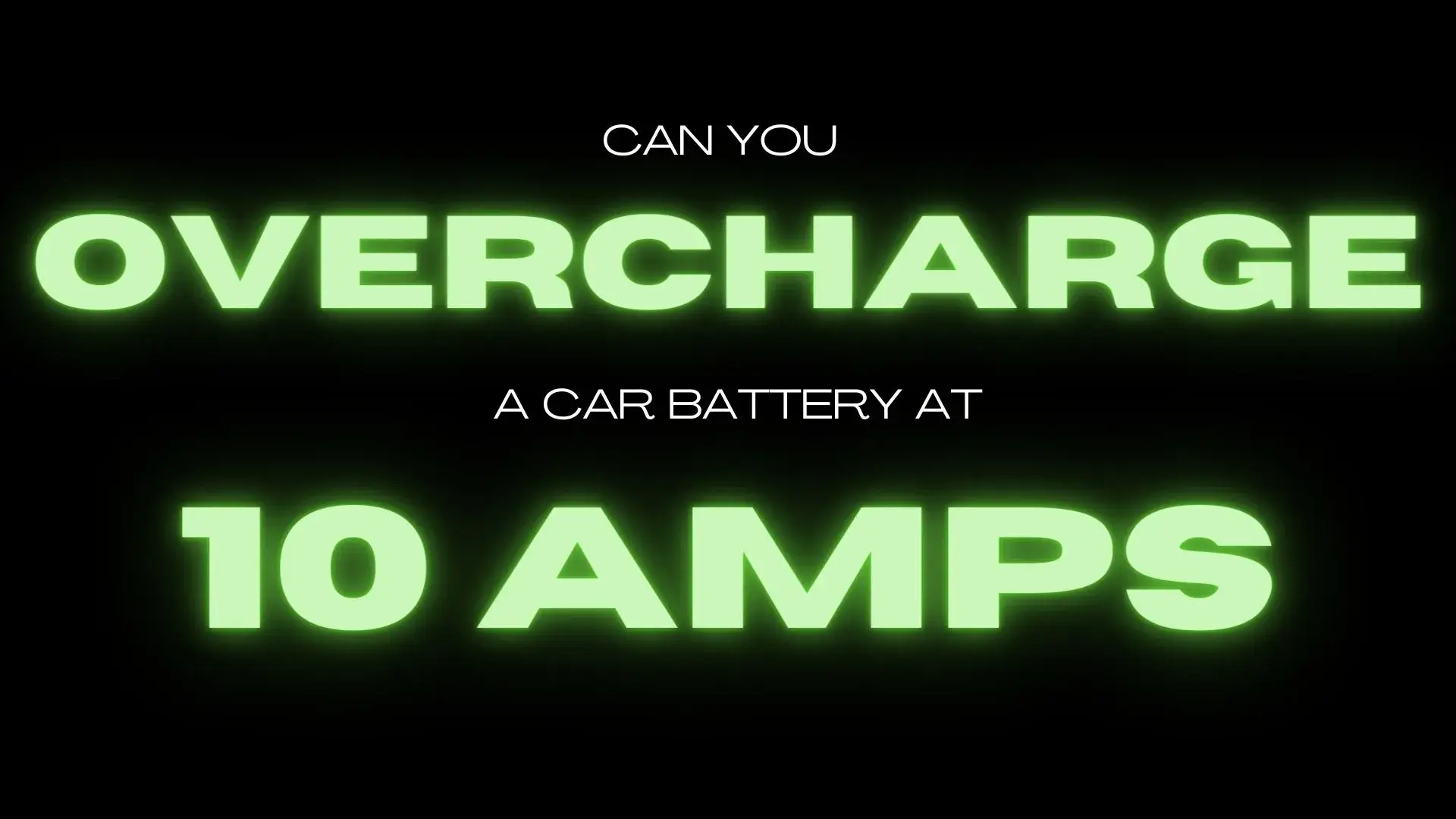Discover if overcharging a car battery at 10 amps is safe. Learn the risks and how to avoid damage. Can You Overcharge a Car Battery at 10 Amps?
If you’re a car owner, you may be wondering if you can overcharge your car battery at 10 amps and what the risks are. The answer is yes, it is possible to overcharge a car battery at 10 amps.
But, like most things, the detailed answer is not so simple. Did you know that most modern chargers have overcharge protections and auto cut-offs?
In this post, we’ll explore why overcharging can be harmful and give you the information you need to avoid it and keep your vehicle running smoothly.
Table of Contents
Can You Overcharge a Car Battery at 10 Amps
In this day and age, most of the chargers available are smart chargers. This means that you can set and forget your charger and go back to it when you feel like it. But if you have a ‘dumb’ charger, leaving it connected for too long can risk overcharging your battery.
So there are two parts to this question. The first is how long can you leave a 10 amp charger on the battery without damaging it. The second is how long it will take to fully charge the battery.
Let’s look at both.
If you have a dumb charger that needs monitoring, how do you work out how long for?
The rule of thumb here is to keep an eye on the battery and check it regularly to avoid overcharging. You should charge your battery for no longer than 12 hours at a time. This will prevent any damage to the battery and keep it in good condition.
If you want to be deadly accurate, use a voltmeter to check the battery regularly, and aim for 12.6 Volts for a full charge.
When it comes to the second part of the question, the time it takes to fully charge a battery will depend on a few factors. These include the size of the battery, the charging rate of the charger, and the condition of the battery.
As a rough estimate, a 10 amp charger will take around 4-6 hours to fully charge a typical car battery.
But, it’s always best to consult the manufacturer’s instructions for charging times and guidance.
| Amperage | Charging Time (Fully Charged) |
|---|---|
| 2 amps | 24 hours |
| 6 amps | 8 hours |
| 10 amps | 4-6 hours |
| 20 amps | 2-3 hours |
Understanding Car Battery Charging
Let’s look in closer detail.
Amps
To charge a car battery, we need to know about amps. Amps are the flow of electrical current from the battery charger. The higher the number of amps, the faster the charge. A low number means a slow charge.
Capacity
Now, let’s talk about capacity. Capacity refers to how much power a car battery can store. It’s typically measured in amp hours (Ah). A higher-capacity battery holds more power, while a smaller one holds less. To choose the right charger, we need to know our battery’s capacity.
Charging Time
Charging time is crucial. Overcharging can damage batteries, especially lead-acid types. To avoid this, I estimate my charging time.
I divide my battery’s amp hours by my charger’s amps. It helps me determine how long it takes to charge my battery.
For instance, let’s say my car battery has a 50Ah capacity. I used a 10-amp charger. Here’s a simple calculation:
50Ah (battery capacity) ÷ 10A (charger amps) = 5 hours (charging time)
We are safe enough if we add another 10 percent to this to ensure a complete charge. So, in this case, we are within safe limits at 5 hours 30 minutes. Following this method, I can prevent overcharging and protect my battery.
Dangers of Overcharging
Let’s look at some of the problems associated with an overcharged battery.
Indications of Overheating
The first sign of battery overcharging is likely to be overheating. This will quickly cause damage to the battery and then other components in the engine. The battery may become too hot to touch and may start to emit hydrogen gas and/or smoke.
Another thing I pay attention to is any smell. If I notice a rotten egg smell around my battery, that is another sign of overcharging.
And, less noticeable, but problematic all the same, overcharging can also cause the battery to swell. This is also dangerous.
Impact on Performance
An overcharged battery can lead to a decrease in performance. This is because the insides of the battery have been affected. If the internal structure of the battery is damaged so are the life span and capacity.
This leads to unreliable performance. When this happens, your car’s electrical devices might not work efficiently. Dimming lights, sluggish power windows, and an erratic audio system are all symptoms. In some cases, the battery won’t crank the engine at all.
Lifespan and Safety
Overcharging affects the lifespan of the car battery. The electrolyte evaporates, leaving the battery dry. This damages the lead plates within the battery that are so essential to charging. This decreases the battery’s capacity to hold a charge and shortens its life.
Furthermore, safety is important to me. An overcharged battery can leak acid, which is hazardous and can lead to a fire or explosion. So, I make sure to avoid overcharging my battery to keep myself and my vehicle safe.
Charging with Different Amps
When it comes to charging car batteries, the amperage matters! In this section, I’ll discuss how 2 amp, 10 amp, and 20 amp chargers affect the charging process and battery life.
2 Amp Chargers
I often use 2 amp chargers for my smaller batteries, like motorcycle batteries. These chargers are gentle and take longer to charge a 12-volt battery. Charging at 2 amps is suitable for specific types of batteries if long charge times aren’t a concern.
10 Amp Chargers
For standard lead-acid car batteries, I prefer using a 10-amp charger. It’s a good balance between charge time and battery health. Charging at 10 amps allows the battery to reach its full capacity faster than 2 amps. The risk of damage from overcharging or charging too fast is minimal. In most cases, a 10 amp charger can charge a car battery overnight, so it’s convenient too.
Remember that any overcharging, even at low levels, can damage the lead plates, decreasing battery life.
20 Amp Chargers
20 amp chargers charge a car battery even faster than 10 amp chargers. But I don’t recommend using them too often. Faster charging increases the risk of overcharging, which can damage the battery. Plus, charging at high amperages generates more heat. This reduces overall battery performance and lifespan.
Remember, choose the correct charger amperage based on your specific battery type and capacity. My advice is to stick between 2 and 7.5 amps (not higher than 10 amps) for the best overnight results.
When I need to charge my car battery slowly, I use a trickle charger. It’s a good solution to maintain a full charge and prevent battery drain. Trickle charges maintain your battery during long periods of underuse. But you can also use them to charge your battery if time is not an issue.
To use a trickle charger, connect it to your car battery and then plug it in. After 30 minutes or so, check the battery’s voltage to make sure it’s within the proper range of 12.6 to 14.7 volts. If it is not there yet, leave it to charge longer.
A lot of modern trickle chargers have an intelligent function known as “float mode”. This switches the charger into maintenance mode once the battery is full. This zaps the risk of overcharging, as it maintains the battery at an optimal voltage.
Safe Charging Practices
When it comes to charging my car battery, I always make sure to follow safe practices.
- Wear appropriate PPE for hand and eye protection when working closely with or handling batteries.
- Select the correct amperage based on your battery type, capacity, and your needs.
- If you are using a charger without an auto shut-off, regularly check the battery with a voltmeter to make sure it’s not overcharged.
- Don’t charge for more than 12 hours at a time.
- Use a smart charger if possible.
- Follow the manufacturer’s instructions for charging times and guidelines.
Before You Go…
Before you go, I want to share with you another post that will expand your knowledge about car batteries. In “How Does a Charger Know When a Battery is Full? Find Out How it Knows When to Quit“, we’ll explore the tech behind battery chargers and how they know when to stop charging.
This is a must-read for anyone interested in the inner workings of their car battery. Don’t miss out on this informative article!
Can you overcharge a car battery at 10 amps?
Yes, it’s possible to overcharge a car battery at 10 amps. A faulty voltage regulator, for instance, can cause overcharging.
How long does it take to charge a car battery?
That depends on the charger’s power output. Typically, a 10-amp charger takes anywhere between 4 to 11 hours. A 2-amp charger will take longer.
What should I look for to prevent overcharging?
Keep an eye on the voltage. If the voltage is significantly higher than normal, your battery might be overcharging. Be cautious and consult a professional.
Are there any signs that my battery is overcharging?
Yes. Keep an eye out for these signs:
- Swollen or cracked battery case
- Reduction in battery life
- Acid leaks from the battery
Take your car to a professional if you notice the above symptoms. They can handle it best.
Related Articles
- What Happens If You Jumpstart a Car Too Often? The “Shocking” Truth of Too Much Juice
- How Does a Charger Know When a Battery is Full? Find Out How it Knows When to Quit
- Can You Jump a Car with a Battery Charger? All You Need To Know Before You Try
- Trickle Charger Vs Battery Charger: 4 Key Differences You Can’t Risk Ignoring


